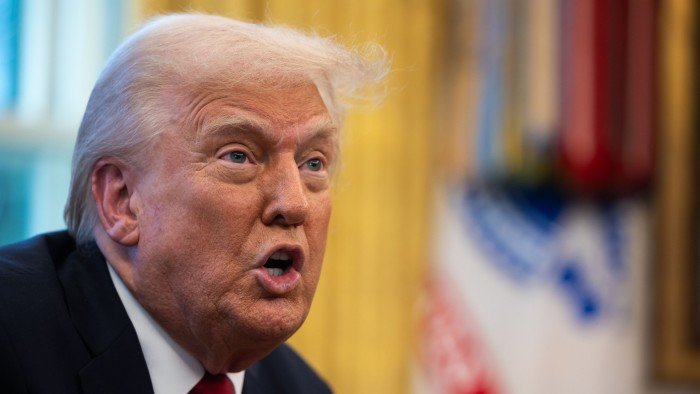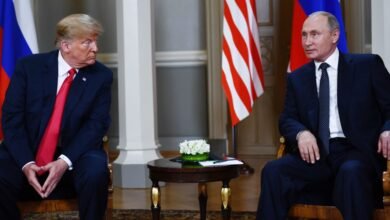Donald Trump to impose 25% tariff on car imports

The US will impose 25 per cent tariffs on imports of foreign-made cars, Donald Trump said on Wednesday, as he announced a significant escalation in his trade war with America’s allies.
The tariffs will go into effect on April 2, the US president’s self-imposed deadline for unveiling numerous reciprocal tariffs against US trade partners.
“This is the beginning of Liberation Day in America,” Trump said in the Oval Office on Wednesday evening. “If you build your car in the United States there will be no tariff.”
Asked if there was anything carmakers could do to have the tariffs removed, Trump replied: “This is permanent, 100 per cent.”
The president offered a reprieve to the industry this month when he temporarily exempted all goods that complied with the 2020 United States-Mexico-Canada Agreement trade agreement from new tariffs.
Trump did not outline any such exemptions. “For the most part, I think it’s going to lead cars to be made in one location,” he said.
A US official later confirmed the tariffs would apply to car parts as well as completed vehicles. A White House factsheet said parts subject to the tariffs would include engines, transmissions, power-train parts and electrical components.
The official added that the 25 per cent levy would apply in addition to any other tariffs.
Cars that are compliant with the trade terms of the USMCA and enter the US will only face a tariff on their foreign parts, a US official said.
“For example, if a car from Mexico comes in with 50 per cent American parts and 50 per cent foreign parts, the tariff will be 50 per cent of 25 per cent which is 12 and [a] half per cent,” the official said.
Parts entering the US under the USMCA will temporarily be exempt from the tariffs but face 25 per cent levies on their non-US content once a process is developed to calculate them, according to the factsheet.
“The revenues we’re going to use to give the largest tax cut in American history,” a US official said. “Tariffs equal tax cuts.”
The White House invoked a 1962 national security law to apply the tariffs, arguing that the country’s car industry was “vital” for national security and “has been undermined by excessive imports threatening America’s domestic industrial base and supply chains”.
Ursula von der Leyen, president of the European Commission, said the bloc regretted the move.
“We will now assess this announcement, together with other measures the US is envisaging in the next days,” she said. “The EU will continue to seek negotiated solutions, while safeguarding its economic interests.”
Von der Leyen added: “As a major trading power and a strong community of 27 member states, we will jointly protect our workers, businesses and consumers across our European Union.”
The United Auto Workers union welcomed the tariffs. “Ending the race to the bottom in the auto industry starts with fixing our broken trade deals, and the Trump administration has made history with today’s actions,” said Shawn Fain, UAW president.
Carmakers have lobbied heavily against the tariffs, arguing they would upend supply chains and increase the cost of cars for US consumers.
General Motors shares slid 7 per cent in after-hours trading on Wednesday, while US-listed shares of Chrysler parent Stellantis fell 4 per cent, according to FactSet data. Ford slipped about 5 per cent.
Almost half of vehicles sold in the US are imported and cars assembled in the US contain nearly 60 per cent foreign-sourced parts, according to Bernstein analyst Daniel Roeska.
“A 25 per cent [tariff] on automotive imports lasting beyond four to six weeks would likely have a chilling effect on the entire sector as [original equipment manufacturers] need to grapple with significant impact to the bottom line,” he said.
Jessica Caldwell, head of insights at automotive research company Edmunds, said vehicle prices were likely to rise as carmakers passed increased costs on to consumers.
“With the tariff set at a notable 25 per cent, it’s reasonable to expect that vehicle prices will rise, which presents an added challenge to an industry that is already grappling with ongoing affordability concerns,” she said.
The largest source of vehicle imports to the US is Mexico, which sent 2.77mn cars across the border in 2024, the vast majority tariff-free under the USMCA. Mexico’s economy minister Marcelo Ebrard was in Washington on Wednesday to meet commerce secretary Howard Lutnick.
The tariffs could be a devastating blow to Mexico’s economy, where a million people are directly employed in a sector that accounts for about 4 per cent of GDP.
Canadian carmakers also criticised the move. “China could only dream of damaging the American auto industry so quickly and so decisively as what the American president is threatening to do here again,” said Flavio Volpe, president of Canada’s Automotive Parts Manufacturers’ Association.
Canadian Prime Minister Mark Carney said his government would use revenues raised from retaliatory tariffs to fund and protect vulnerable workers and companies.
“This is a direct attack on the workers I stood in front of this morning, at the Ambassador Bridge [linking Canada and the US], a bridge that is the symbol, and a reality up until now, of the tight ties of our two countries,” Carney told reporters on Wednesday evening.
Shares in Japanese automakers, which sent $40bn worth of cars to the US in 2024, fell as trading began in Asia. Subaru and Mazda led the fallers at more than 5 per cent. Mitsubishi Motors dropped 4 per cent, and Toyota and Nissan were down by almost 3 per cent.
Trump’s announcement was the latest in a series of tariffs he has rolled out since his return to office in January, including an additional 20 per cent levy on all goods from China and 25 per cent on all steel and aluminium imports.
This week, Trump said the US would apply 25 per cent tariffs on all goods from countries that bought Venezuelan oil and gas, also beginning on April 2. Those tariffs are likely to hit China, India, Spain and Italy, among others.
“Basically, I view it as reducing taxes and also reducing debt,” Trump said, of his tariffs. “And within a fairly short period of time, I think we’re going to have a balance sheet that’s going to be outstanding.”
Additional reporting by Andy Bounds, Ilya Gridneff and Christine Murray
https://www.ft.com/__origami/service/image/v2/images/raw/https%3A%2F%2Fd1e00ek4ebabms.cloudfront.net%2Fproduction%2Faca13bee-09e0-44a3-a966-da325d3fdd8d.jpg?source=next-article&fit=scale-down&quality=highest&width=700&dpr=1
2025-03-27 01:47:16





